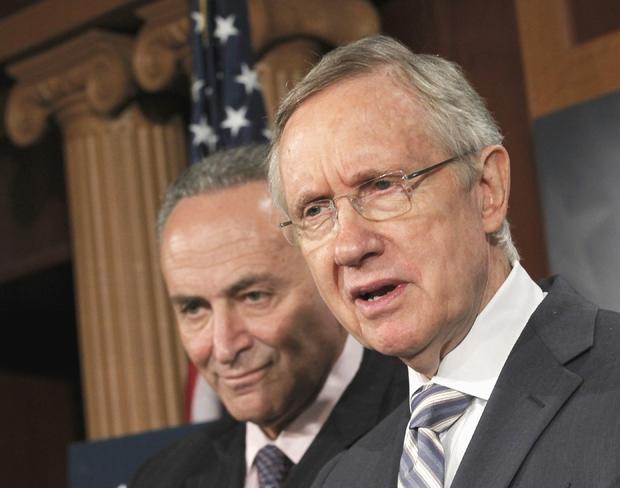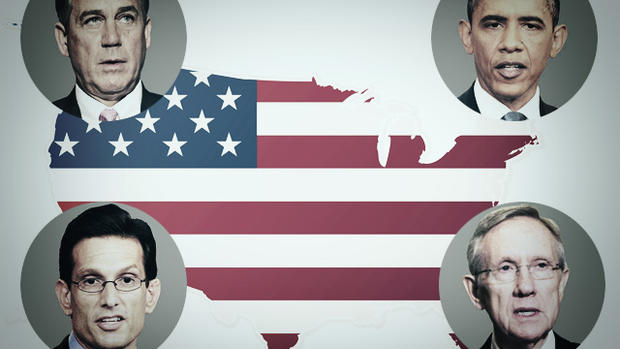War of words continues as debt limit deadline nears
Updated: 6:51 p.m. ET
With less than a week to go before the Obama administration's August 2 deadline for raising the national debt limit, Democrats and Republicans continue to spar over the relative merits of two separate proposals - one Republican, one Democratic - and a bipartisan agreement appears far from the horizon.
Leaders from both parties continued on Wednesday to push for their own plan while lambasting the other. Neither House Speaker John Boehner's Republican proposal nor Senate Majority Leader Harry Reid's Democratic plan, however, appears to have the necessary votes to pass through Congress.
In a press conference on Wednesday, Reid argued that the Democratic plan was the only "true compromise" on the table, and urged lawmakers to rally around it.
"We're running out of time," he told reporters. "It's time to get serious about finding a compromise."
Dueling debt plans: How they compareLast-ditch GOP debt plan emerges
Some Republicans push back against Boehner's plan to raise debt limit
The Boehner plan, Reid argued, did not qualify as anything more than a "big wet kiss" to the Tea Party - and he pledged that "every Democratic senator will vote against" it.
"It's too bad his caucus is being run by such a small number of people," Reid said, of Boehner. "[House Republicans] are struggling to save a Tea Party bill... The way to resolve this crisis is to ignore the extremists and meet in the middle of the road."
Even as Democrats blast Boehner for putting forth a plan they say caters heavily to the Tea Party, the conservative movement is, in fact, speaking out against the GOP bill - and many believe Tea Party-oriented lawmakers could prevent its passage in the House.
"I am confident as of this morning that there are not 218 Republicans in support of the plan," Rep. Jim Jordan, R-Ohio, said in a Tuesday morning press briefing.
Jordan is one of a handful of Republican lawmakers who have said they will not support Boehner's proposal because it fails to go far enough to reduce the debt. He is also one of 38 conservative lawmakers who earlier this year signed a pledge to vote against any debt increase that was not attached to an amendment to the Constitution requiring a balanced budget.
CBSNews.com special report: America's debt battle
Boehner's two-step proposal to raise the debt ceiling, which he unveiled Monday afternoon, mandates immediate cuts and caps in discretionary spending in exchange for a short-term increase to the debt limit. A second increase to the debt limit would then be tied to a plan for further deficit reduction, to be determined by 12-member committee. The proposal also requires the House and Senate to vote on - but not necessarily pass - a balanced budget amendment by the end of the year.
In a closed-door meeting with the entire House Republican conference Wednesday morning, Boehner made a passionate entreaty for his bill and told fellow Republicans to "get your ass in line."
"I can't do this job unless you are behind me," he said.
Speaker Boehner needs 217 votes to pass the bill. He can afford to lose 23 Republican votes if he does not pick up any Democratic support.
As of Wednesday evening, 16 House Republicans had told CBS News they planned to vote against Boehner's bill, and seven said they were leaning toward voting against it. Forty-nine House Republicans said they would vote for it, and eight said they were leaning toward voting for it. Fifty-seven Republicans told CBS they were still undecided.
Democrats argue that because Boehner potentially lacks even the House votes to pass his bill, he is necessarily wasting time as the clock ticks toward economic catastrophe.
"The speaker's plan is on life support - and it's time for him to pull the plug," Sen. Chuck Schumer, D-N.Y., told reporters on Wednesday. "The bill remains a nonstarter in the Senate and the president will never sign it."
Schumer argued that the time had come to move on to plans that "have a chance of passing" instead of allowing Boehner to be "led by a fringe in his caucus that thinks a default is okay."
Top 6 Ways a U.S. Credit Rating Downgrade Could Cost AmericansWhat Would Debt Default Mean to Average Americans?
"How many times do we need to throw red meat to the right wing in his caucus?" Schumer asked. "Enough already!"
"Our bill is better in every way, even when it comes to spending cuts," Schumer added.
The Democratic bill calls for $2.2 trillion worth of spending cuts over the next 10 years, according to an analysis by the Congressional Budget Office. In exchange, the debt limit would be increased through the end of next year. The plan circumvents the main objections to a deal from the left and the right by both avoiding cuts to entitlement programs and declining to include revenue increases. However, it includes $1 trillion in reductions from winding down the cost of the wars in Iraq and Afghanistan -- something critics say should not count in the total savings.
Reid initially touted $2.7 trillion worth of cuts in the plan, but says that even after the CBO's revised figure, "We are confident our final bill will meet our bottom line."
"Understand that with CBO we always give them something to look at and rarely is the first run-through what we wind up with," he said. "For us to wind up at $2.4 to $2.5 trillion [in cuts] is fairly easy to do."
The House Republicans' proposal also fell short of claims: The CBO initially said that plan would save only $850 billion over a decade, not the $1.2 trillion claimed by House Speaker John Boehner. (The plan would seek more spending cuts in about six months.)
Boehner decided to retool his plan following the CBO report, and on Wednesday evening announced that the revised proposal reduced up to $917 billion over 10 years. However, it would raise the debt limit by only $900 billion -- which would cover debts for just five months, through January 2012.
Republicans, meanwhile, maintain that Democrats are holding up Boehner's bill in the interest of Mr. Obama's re-election campaign - not the country's economic interests.
"The only thing in this bill that the president hasn't already expressed his support for, either publicly or privately, is that it doesn't get him through his election without having to engage in another national discussion about the debt crisis that's brought us to this point," said Senate Minority Leader Mitch McConnell, R-K.Y., in remarks on the Senate floor Wednesday.
Obama takes debt case to American peopleBoehner: Obama created the "crisis" atmosphere
Boehner: I didn't want "mano-a-mano" with Obama
No blood spilled in dueling debt speeches
"Do they really intend to suggest that he veto the nation into default for political reasons?" he continued. "That's how I read the threat."
Mr. Obama has repeatedly pledged to veto any deal that does not raise the debt ceiling through the end of 2012 because, he argues, the debate will only grow more contentious as election season moves into full swing - and the American economy will become increasingly at risk.
McConnell, however, points to a different reason: "What he wants more than anything else is more room under the debt ceiling to get him through the election."
In a press briefing on Wednesday, White House Press Secretary Jay Carney dismissed that angle, emphasizing that "this is not a question of who it helps or hurts politically."
"You could argue... this fight is good [for Democrats] politically, but it's bad for the economy," he continued.
Democrats don't appear to be moving closer toward accepting a short-term deal, either.
Rep. James Clyburn, D-S.C., on Wednesday urged Mr. Obama to veto a short-term debt limit increase - and then, with the same pen, sign an executive order to raise the debt ceiling.
"He should put it on his desk next to an executive order that he will have drawn up," Clyburn said of the House bill, assuming that it were able to pass through both chambers of Congress. "And with the same pen that he vetoes that short-term debt ceiling extension he should sign an executive order invoking the 14th Amendment to this issue."
The White House has said, however, that the 14th Amendment option has been categorically ruled out.
"Our position hasn't changed," Carney said on Wednesday. "There are no off-ramps. There's no way around this. There's no escape. And, you know, having an esoteric constitutional argument won't resolve the fact that our borrowing authority is due to expire on August 2nd."
Carney expressed confidence that Congress would reach a deal before that deadline, but warned of a "Sophie's Choice" situation in the absence of an agreement.
"Who do you save?" he asked. "Who do you pay?"
Carney said the Treasury Department would likely disclose its list of spending priorities "if and when we get closer to August 2nd and cooler, saner heads have not prevailed in Congress and we don't yet have an agreement." (Later, a White House official amended Carney's statement, noting instead that "Treasury will provide more information as we get closer to August 2 regarding how the government would operate without new borrowing authority if the debt limit is not increased.")
Carney emphasized, however, that he did not think it would come to that."In the end, as crazy in many ways as this situation has become, given that it is so clearly within the capacity of Congress to find the compromise that could clear both houses and be signed in to law to solve this problem, I still believe that, because the stakes are so high and because the American public so clearly wants this done in the right way, that in the end, it will get done," he said.

